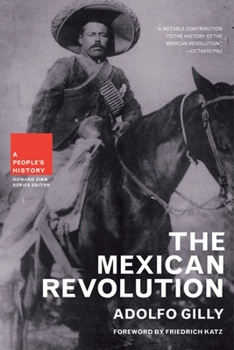The Mexican Revolution
Select Format
Select Condition 
Book Overview
First published in Spanish in 1971, The Mexican Revolution has been praised by Mexico's Nobel Prize-winning author Octavio Paz as a "notable contribution" to history and is widely recognized as a seminal account of the Mexican Revolution. Written during the author's time as a political prisoner in the famous penitentiary of Lecumberri in Mexico, it sold thousands of copies in its first edition, becoming widely accepted as the official textbook...
Format:Paperback
Language:English
ISBN:1595581235
ISBN13:9781595581235
Release Date:November 2006
Publisher:New Press
Length:416 Pages
Weight:1.08 lbs.
Dimensions:1.2" x 6.0" x 7.9"
Customer Reviews
3 ratings
Not Your Barack Obama Liberalism
Published by Thriftbooks.com User , 15 years ago
Written from a Mexico City prison cell almost five decades ago now, Adolfo Gilly relates the political history of the peasant insurrections - Emiliano Zapata's in the south, and Francisco "Pancho" Villa's in the north -- gripping Mexico between 1910 and 1920. Though much is undoubtedly lost in the translation to English, Gilly's work is decidedly incomplete - if you want the thorough sight, sound, taste and smell of the Mexican Civil War, you're not going to find it here. Gilly's singular focus is on the politics - parliamentary, military, cloak & dagger, and otherwise. Though Gilly does not overlook their successes in shifting the political platform of the victorious Constitutionalist movement leftward, Gilly is brutally honest in recounting each of Zapata and Villa's errors, and matter-of-fact in proclaiming the superior tactics of the victorious, if treacherous, bourgeois opportunists. Having won the war militarily in December 1914, Villa and Zapata yet failed for want of a national political program - a failure Gilly spares no detail in recounting, through their respective heartbreaking deteriorations in ensuing years. The subtext is a manual for a movement, from that Mexico City prison cell a monument to a new generation of revolutionaries who will not repeat Villa and Zapata's mistakes.
A great contribution to the political history of the Mexican Revolution
Published by Thriftbooks.com User , 15 years ago
This book was originally published in Spanish in 1971 yet it is still a great read for any student, scholar or lay reader interested in the political history of the Mexican Revolution. Professor Adolfo Gilly wrote this book from his prison cell during one of Mexico's most brutal presidencies. The academic fortitude of Dr. Gilly is evident through his prolific writing and historical description of the causes leading up to the first social revolution of the 20th century: The Great Revolution, as it is also known. I have read this book in Spanish as well (La revolucion interrumpida), but I like this book in particular because it includes a beautifully well written foreword by Dr. Friedrich Katz (one of the leading and most knowledgeable scholars on the Mexican Revolution) and a preface to the English-Language Edition by Gilly himself. In the prologue Gilly explains how it was writing this book from a prison cell and the sources he used. As a university student of history I strongly recommend this book to anybody who is interested in the political history of the Mexican Revolution. This is definitely a well written book.
You Say You Want A Revolution
Published by Thriftbooks.com User , 18 years ago
This is a good book because it makes you think. I do not agree with some of the author's conclusions but this book is a great step forward in the popular treatment of the Mexican Revolution. Gone are both the Romanticism and the anti-Mexican stereotypes which characterized previous popular histories. In addition, overrated figures such as Francisco Madero are reduced to reasonable size. Sadly, however, the battles of the revolution, which, in a particullar way, reflected the role of the people are slighted somewhat. The book deals with the the economic and social aspects and results of the revolution. Much attention is paid to the Zapatista movement in Southern Mexico and its influence on subsequent Mexican History. Another topic explored here is Villa's Northern Division and its impact. The author also demonstrates how most of the revolutionary leaders made attempts to deal with the evils of the Diaz dictatorship. It think that the author is unfair in dealing with some of the more conservative figures such as Carranza and Obregon whose work, good and bad, is reflected in the modern Mexican state. I also find the author's marxist analysis, although pertinent, is less effective in describing a society which was heavily agricultural in 1910 and continued to be heavily agricultural for many years afterward. Nevertheless, this book is not the same old story. It presents the issues of the revolution in a more concrete form and provides a starting place for people who wish to explore the academic literature of the revolution. Finally, it presents the social and economic aspects of the revolution in the most readable manner possible.





